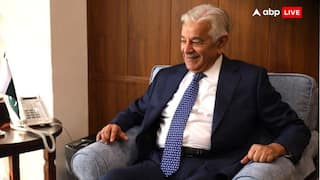World Stroke Day 2023: What Are Strokes? How Do They Occur? All You Need To Know
The primary objectives are to promote understanding about stroke prevention and treatment, as well as to enhance the quality of care and assistance provided to survivours.

World Stroke Day, which falls on October 29, serves as a global event dedicated to highlighting the gravity and prevalence of strokes. Its primary objectives are to promote understanding about stroke prevention and treatment, as well as to enhance the quality of care and assistance provided to survivours. In this article, we will delve into what stroke is all about, its symptoms, diagnosis, causes and more.
What Are Strokes And How Do They Occur?
Dr. Lokesh B, who is a Consultant - Neurology, at Aster CMI Hospital, Bangalore said, "Strokes, often referred to as cerebrovascular issues, are medical emergencies that occur when the blood supply to a part of the brain is interrupted or reduced, leading to damage or destruction of brain tissue. They can have severe and lasting consequences, making it essential to understand what they are and how they occur."
"Ischemic and hemorrhagic strokes are two primary types of strokes. Ischemic strokes are the most common, accounting for about 85% of all cases. They occur when a blood clot or other debris blocks an artery that supplies blood to the brain. This blockage restricts the flow of oxygen and nutrients, resulting in brain cell damage. Hemorrhagic strokes, on the other hand, occur when a blood vessel in the brain ruptures, causing bleeding into or around the brain. This can result from conditions like an aneurysm or high blood pressure," he added.
Risk Factors Of Stroke:
By Dr. Manoj Khanal, who is an Associate Director, of Neurosciences, Neurology, Interventional Neurology, at Max Super Speciality Hospital, Shalimar Bagh mentioned that the risk factors of stroke are divided into two categories Modifiable and Non modifiable:
Modifiable:
- Essential hypertension
- Type 2 diabetes mellitus
- Heart disease
- Smoking
- Birth control pills
- History of transient ischemic attack (TIA).
- High blood cholesterol
- Lack of exercise
- Obesity
- Excessive alcohol use
- Abnormal heart rhythm
- Damaged heart valves
Non modifiable:
- Older age
- Race African American
- Gender male more
- History of prior stroke
- Genetic
Symptoms Of Stroke:
Dr. Vipul Gupta, who is the Chief - Neurointerventional Surgery & Co-Chief Stroke Unit at Artemis Hospital, Gurugram said, "Recognising the symptoms and seeking immediate medical attention is crucial for effective treatment and minimizing long-term damage."
- Sudden Weakness or Numbness: A common sign is sudden numbness or weakness, usually on one side of the body. This can affect the face, arm, or leg.
- Difficulty Speaking: Individuals may experience sudden confusion, slurred speech, or difficulty understanding and forming words.
- Trouble Walking: Sudden dizziness, loss of balance, or difficulty walking can occur. It may feel like one side of the body is heavier.
- Severe Headache: A sudden, severe headache, often referred to as the "worst headache of your life," can be a symptom of a hemorrhagic stroke.
- Visual Disturbances: Sudden vision problems, such as blurred or double vision, can be indicative of a stroke.
He also spoke about the FAST method for quick recognition of stroke and said that an easy way to remember stroke symptoms is the FAST method:
F (Face): Ask the person to smile and check for facial drooping.
A (Arms): Have them raise both arms to see if one drifts downward.
S (Speech): Listen for slurred or garbled speech when they repeat a simple phrase.
T (Time): If you observe any of these signs, it's time to call emergency services immediately.
Diagnosis Of Stroke:
- Imaging Tests: Imaging scans, such as a CT (computed tomography) or MRI (magnetic resonance imaging) of the brain, are essential to determine the type of stroke, whether it's ischemic (caused by a clot) or hemorrhagic (caused by bleeding).
- Electrocardiogram (ECG or EKG): This test may be conducted to check the heart's electrical activity and identify any irregular heart rhythms that could contribute to stroke.
- Angiography: In some cases, an angiogram may be performed to visualize blood vessels in the brain, helping to identify abnormalities.
Preventive Measures For Stroke:
In this regard, Dr. Lokesh B said, "Preventative measures such as lifestyle changes, medication, and surgery, in some cases, can help reduce the risk of strokes. The key lies in controlling risk factors, such as maintaining a healthy diet, exercising regularly, quitting smoking, and managing chronic conditions. Public awareness campaigns and education about the warning signs of strokes are also crucial to ensuring that individuals and their loved ones can respond promptly when a stroke occurs, potentially saving lives and reducing the long-term impact of this serious medical condition."
[Disclaimer: The information provided in the article, including treatment suggestions shared by doctors, is intended for general informational purposes only. It is not a substitute for professional medical advice, diagnosis, or treatment. Always seek the advice of your physician or other qualified healthcare provider with any questions you may have regarding a medical condition.]
Check out below Health Tools-
Calculate Your Body Mass Index ( BMI )
Calculate The Age Through Age Calculator
Related Video
Breaking: ED Busts UP Cough Syrup Smuggling Network, ₹400 Crore Fake Firms Scam Uncovered







































